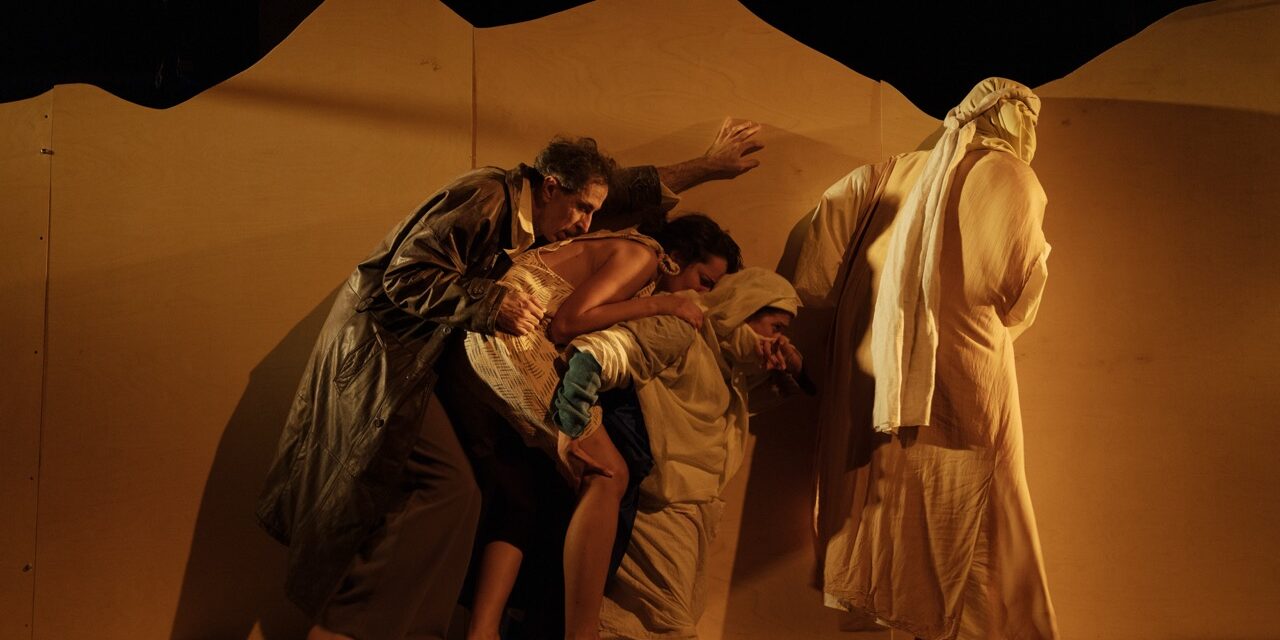Sarajevo War Theatre (SARTR), presented as part of the 65th International Theatre Festival MESS
All that pharmacist Rafael Pinto has ever truly known is escape and love. From the outbreak of the First World War and his first stolen kiss, to the endless trenches of the East and his first true love; from exile to Shanghai, the raising of his daughter, and the unending longing for his hometown, Sarajevo, that echoes through every mile of the journey. In just two hours and forty minutes, much can unfold — a lifetime, even.
In collaboration with dramaturgs Emina Omerović and Nejra Babić Halvadžija, director Selma Spahić triumphantly succeeds in distilling the vast emotional and historical landscape of Aleksandar Hemon’s award-winning novel The World and All That It Holds into a stage experience. The result is an epic story of love and loss, war and remembrance that asks what remains when time, language, and homeland are stripped away. At the 65th edition of the International Theatre Festival MESS, the Sarajevo War Theatre’s production received the Golden Laurel Wreath for “Best Performance” and “Best Actor” (Ermin Bravo), as well as the Golden Mask of Liberation, securing the highest number of awards this season.
There is a Hemon quote that goes something like this: “Light changes the world. And yet everything stays the same.” At the beginning of the play, darkness reigns, accompanied by the sound of two beautiful voices humming an unfamiliar melody. Only when the final tone fades do the working lights of the Sarajevo War Theatre come on, making room for the life story of Rafael Pinto (Ermin Bravo) to unfold. It all begins in Sarajevo on 28 June 1914. While Gavrilo Princip fires the two shots that will kill Franz Ferdinand and his “Soferl,” setting off the First World War, Pinto is kissing a handsome Rittmeister from the Austrian military within the four walls of his pharmacy, located just a stone’s throw from the site of the assassination. On this day, “The whole world exploded” and with it, Pinto’s dunjaluk (world) becomes another.
In the trenches of the First World War, Pinto is assigned as a military doctor. Amid the dirt and rubble of horrific devastation, he meets his beloved Osman Karišik (Alban Ukaj). Together, they survive the impossible: war, imprisonment, espionage, and homophobia. It is not until a quiet summer day in Tashkent, Uzbekistan, in 1919, in the rose garden of Isak Abramović — a Russian-Jewish intellectual and former revolutionary who provides Pinto and Osman with shelter and a sense of stability during their captivity — that they finally decide to weave a future together. They dream of returning to the Sarajevo quarter of Hrid, where they plan to plant roses and stroll through the Baščaršija, hand in hand, shameless and content.
The chemistry between Bravo and Ukaj, who previously shared the stage in productions such as Othello — with Bravo as the title figure and Ukaj as Iago, directed by Ukrainian artist Oksana Dmitriievac — is compelling and electrifying. The two actors effortlessly balance intensity and subtlety, creating moments of raw emotional power that linger long after the curtain falls. The same can be said for the entire ensemble: Jelena Kordić, Tatjana Šojić, Kemal Rizvanović, Igor Skvarica, Hana Zrno, and Faruk Hajdarević deliver performances that are consistently nuanced, deeply engaging, and astonishingly precise. Each actor brings their character vividly to life, and together they form a cohesive, dynamic unit that elevates every scene. The synergy, timing, and commitment of the ensemble make the production not just a retelling of Hemon’s novel, but a fully immersive theatrical experience.
While the dramaturgy of the evening flows linearly from one place to another, Pinto experiences flashbacks that transport him to his most cherished childhood memories. He recalls his late Sephardic mother, dressed in traditional dimije and a pinkish-rose-colored fez, accompanied by the haunting melody of “Nočes, nočes” (“Nights, nights”), which becomes a leitmotif of the performance. When Rafael finally reaches Shanghai in 1932, working at a nightclub curing sex workers of all manner of diseases, these vivid memories from his imaginative mind transform into the hallucinatory visions of an opium addict.
It is the different locations and states of consciousness of the main character that allow Spahić to guide her audience through a microcosm of itself. The stage (Lili Anscütz) is built with four wooden walls, including platforms, metal frameworks, and similar structures that define the performance space. Amidst these four walls, the audience sits on wooden chairs that can rotate around their own axis — like planets, each viewer a world unto themselves. From this arrangement, the spectators follow the action unfolding on all four sides of the space. Selina Orb’s costume design transports the audience faithfully through four decades, two continents, and different cultures, while a complex light design and the tender musical arrangements by Sevdah musician Damir Imamović create a haunting emotional landscape that, by the end of the performance, moves the audience to tears.
Selma Spahić turns Hemon’s sweeping novel The World And All That It Holds into a luminous theatrical odyssey — one that speaks of love, loss, and the unbreakable thread of humanity that binds us all.
Credits
Director: Selma Spahić//Author of original novel: Aleksandar Hemon//Dramatization: Selma Spahić, Emina Omerović, Nejra Babić Halvadžija//Dramaturgy: Emina Omerović, Nejra Babić Halvadžija//Set design: Lili Anscütz//Costume design: Selena Orb//Music: Draško Adžić, Damir Imamović//Choreographer: Ena Kurtalić
Performed by Ermin Bravo, Alban Ukaj, Jelena Kordić, Tatjana Šojić, Kemal Rizvanović, Igor Skvarica, Hana Zrno, Faruk Hajdarević
For more information, visit: Sartr.ba
Berina Musa is a writer, dramaturg, and critic based in Sarajevo and Freiburg. She studied German linguistics, literary studies, and art history at the University of Freiburg and is currently completing a second degree in dramaturgy at the Academy of Performing Arts in Sarajevo. Her plays and short films have been presented at the Bosnian National Theatre Zenica, MESS, the Sarajevo Film Festival, and the Mostra Internazionale del Nuovo Cinema di Pesaro.








